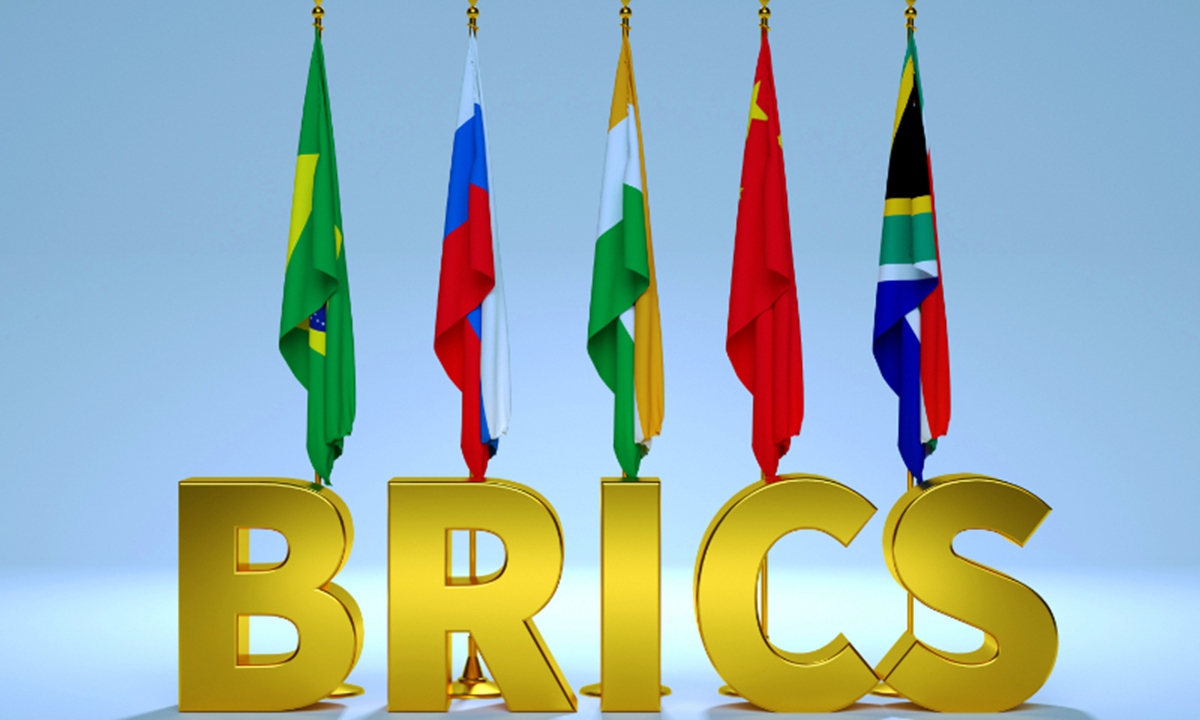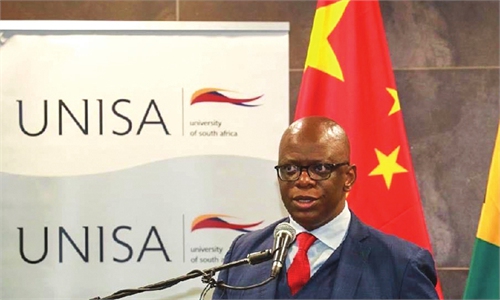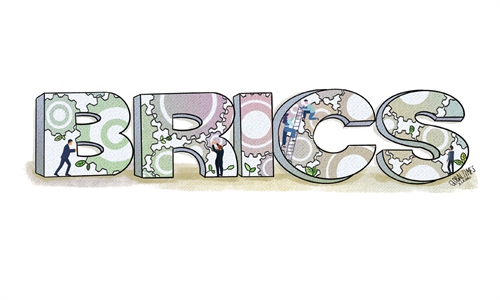
BRICS Photo:VCG
In the ever-evolving and fluid geo-political landscape, the rise of developing countries over the past three decades has emerged as a transformative force, reshaping the dynamics of the international world order. The rise can be traced back to the economic and political changes that took place in the 1990s. In the aftermath of the Cold War, liberalization, deregulation and market-oriented reforms became the prevailing trend across the world. As a consequence of these changes, the Global South's immense growth potential was unlocked, positioning Global South countries as significant global geo-political and economic players.It is within this context that a number of mini-lateral organizations were formed, or forced to reform. An example was the G20 which was a so-called means for key Global South emerging markets to be heard by the G7 countries. However, at the forefront of real transformation was the establishment of BRICS (Brazil, Russia, India, China and South Africa). We are a collective that has, over the past decade, defied conventional wisdom, and disrupted the traditional geo-political and economic alliances, propelling BRICS to the forefront of global political, economic, environmental and financial affairs.
The BRICS group was conceptualized in 2006 when the foreign ministers of Brazil, Russia, India and China met in New York on the sidelines of the United Nations General Assembly (UNGA). The first formal BRIC meeting then took place in Russia in 2009. South Africa joined the group in 2010, thereby changing the acronym to "BRICS." South Africa was invited to join the group precisely to give impetus to the spirit of BRICS as a voice of the most powerful countries of the South. Our entry gave representation and a voice for Africa, and some would argue that we became the first beneficiaries of expansion - from BRIC to BRICS.
The main reason behind the establishment of BRICS was our shared vision as emerging market economies of the Global South. We believed that through our collective voice and coordinated action we could significantly influence economic affairs to include voices of the Global South, given our economic might and potential.
Since the end of World War II in 1945, there has been no change in global governance and the economic, trade and financial architecture systems and institutions that were created such as the UN and the Bretton Woods Institutions, among others. Today they remain archaic, biased, unfair and exclusivist in favor of the Global North, despite the world having changed in almost every respect, including the political and economic rise of the Global South. China's ascent to becoming the world's second-largest economy is perhaps the most striking example of this changing world.
The establishment of the BRICS group has provided a platform for our nations to consolidate our economic clout and lobby for more equitable and inclusive economic and financial reform. BRICS also set out as an objective the reform of the global governance architecture - the UN and its institutions, committees and organizations. BRICS, by harnessing our collective strengths and leveraging common interests, continues to challenge the dominance of traditional powers, promote multipolarity, and advocate for a more equitable global political, economic and financial order. Yet whilst actively campaigning for the reform of the global financial architecture we also established initiatives such as the New Development Bank, the Contingent Reserve Arrangement and the BRICS currency debate to contest, compete and complement existing and traditional global trade and funding mechanisms and instruments. BRICS has thus charted a new disruptive path for financial and economic development and global governance, focusing on inclusivity, fairness, and shared prosperity.
While the original core purpose of BRICS remains, our focus has also evolved as the geo-political and economic landscape we live in today is far more fluid, challenging and complex than it was over a decade ago when BRICS was established. The geo-political landscape today is ambiguous, uncertain, unpredictable and volatile. Our challenges include, but are not limited to, the rise in violent extremism and terrorism, religious fundamentalism, right wing populism, narrow nationalism, racism, xenophobia, climate change, food, energy and water insecurity, internal and regional conflict, war, inequality, poverty and unemployment.
Regional and geo-political alliances are also consistently shifting, some positive and others negative. For example, there is a quiet but tectonic geo-political shift taking place within the Middle East in which Saudi Arabia has begun peace processes with both Iran and Syria which were facilitated by our BRICS partners China and Russia respectively. Should these processes hold, it will change the security dynamics of the entire Middle East and bring lasting peace and stability to the region. On the other hand, the war between Russia and Ukraine has had global reverberations, causing untold harm not only to the two countries, but the broader Global South, as well as creating food and energy shortages. As countries of the Global South, we have been bullied by the North to pick a side - a position that most of us in the Global South reject. Instead, the position that seems to be gaining traction among countries of the Global South is that of non-alignment, as was the case during the Cold War era.
A concerning trend is that there have been consistent attacks on our BRICS partners China and Russia by countries of the North, as well as by Western alliances and organizations such as NATO and the G7. They have used both traditional and non-traditional asymmetrical non-linear tactics of war such as sanctions, currency wars, proxy wars, non-state actors, and traditional warfare amongst others. China and Russia have been the victims of the ''choke, stoke, poke and provoke'' strategy of some Western countries and Alliances, with the latest attack being the veiled threats against China at the G7 meeting in May this year by one of its leading members. Some analysts would argue that this meeting was a declaration of a new Cold War between the G7 and China.
The author is South Africa's ambassador at large for Asia and BRICS Sherpa. opinion@globaltimes.com.cn



